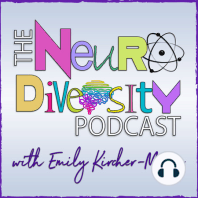33 min listen

“Pathological” Demand Avoidance? Words Matter
“Pathological” Demand Avoidance? Words Matter
ratings:
Length:
42 minutes
Released:
May 18, 2021
Format:
Podcast episode
Description
The language around autism and neurodiversity in general is changing. We talk with Kristy Forbes, founder of Australia-based inTune Pathways, about PDA (Pathological Demand Avoidance), the difference between PDA and other types of demand avoidance, and the changing language of autism, especially the terminology society uses to describe neurodivergent people. ABOUT THE GUEST - Kristy Forbes is the founder of inTune Pathways, is autistic herself, and has been diagnosed with Attention Deficit Hyperactivity Disorder (ADHD) and Pathological Demand Avoidance (PDA). She is a mother to four autistic children, ranging in age from 5 years to 21 years, all with varying autistic expression including non speaking and PDA, and she is married to an autistic man. Kristy has the unique experience and insight into many perspectives: the teacher, the support specialist, the parent, the partner and the person. She understands, accepts, and acknowledges the very real challenges neurodivergent people and their families face, and the severely misunderstood and often undermined position they are in. You can support the podcast and receive subscriber-only benefits at www.patreon.com/neurodiversity. The Neurodiversity Podcast is available on Facebook and Instagram, and on Twitter @NeurodiversePod. For more information go to www.NeurodiversityPodcast.com
Released:
May 18, 2021
Format:
Podcast episode
Titles in the series (100)
A Vision for Gifted Education | ADHD | Intelligence | 2E: Host Emily Kircher-Morris and Kate Bachtel, board president of SENG (Supporting Emotional Needs of the Gifted), and the owner of SoulSpark in Boulder CO, discuss new approaches to educating the gifted, from a parent's perspective and as an educator.... by Neurodiversity Podcast